Cast a Dark Shadow is a 1955 British suspense film noir directed by Lewis Gilbert and written by John Cresswell, based on the 1952 play Murder Mistaken by Janet Green. It stars Dirk Bogarde, Margaret Lockwood, Kay Walsh, Kathleen Harrison and Robert Flemyng. The film released on 20 September 1955, distributed by Eros Films Ltd. in the United Kingdom and Distributors Corporation of America in the United States. The story concerns a husband who murders his wife.

It's Great to Be Young is a 1956 British Technicolor musical comedy film about a school music teacher, starring Cecil Parker and John Mills.

The Ship That Died of Shame, released in the United States as PT Raiders, is a black-and-white 1955 Ealing Studios crime film directed by Basil Dearden and starring Richard Attenborough, George Baker, Bill Owen and Virginia McKenna.
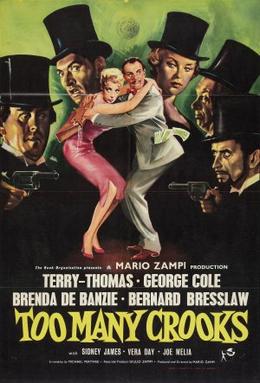
Too Many Crooks is a 1959 British black comedy film directed by Mario Zampi and starring Terry-Thomas, George Cole, Brenda De Banzie, Sidney James, Bernard Bresslaw and Vera Day.

They Came to a City is a 1944 British black-and-white film directed by Basil Dearden and starring John Clements, Googie Withers, Raymond Huntley, Renee Gadd and A. E. Matthews. It was adapted from the 1943 play of the same title by J. B. Priestley, and is notable for including a cameo appearance by Priestley as himself.

Hostile Witness is a 1968 British courtroom drama film based on a play by Jack Roffey, directed by Ray Milland and starring Milland, Sylvia Syms, Raymond Huntley and Julian Holloway.

Double Confession is a 1950 British crime film directed by Ken Annakin and starring Derek Farr, Joan Hopkins, William Hartnell and Peter Lorre. The screenplay by William Templeton is based on the novel All On A Summer's Day by H.L.V. Fletcher, written under the pen name John Garden.

Tom Brown's Schooldays is a 1951 British drama film, directed by Gordon Parry, produced by Brian Desmond Hurst, and starring John Howard Davies, Robert Newton and James Hayter. It is based on the 1857 novel of the same name by Thomas Hughes.
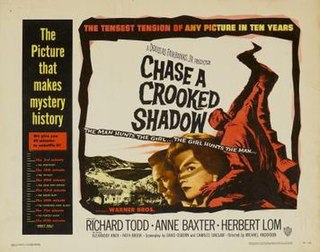
Chase a Crooked Shadow is a 1958 British suspense film directed by Michael Anderson and starring Richard Todd, Anne Baxter and Herbert Lom. It was the first film produced by Associated Dragon Films, a business venture of Douglas Fairbanks Jr.

The Woman in Question is a 1950 British murder mystery film directed by Anthony Asquith and starring Jean Kent, Dirk Bogarde and John McCallum. After a woman is murdered, the complex and very different ways in which she is seen by several people are examined. It was loosely adapted into the 1954 Indian film Andha Naal.
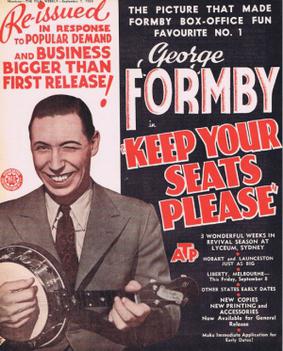
Keep Your Seats, Please is a 1936 British comedy film directed by Monty Banks and starring George Formby, Florence Desmond and Alastair Sim. It marked the film debut of the child star Binkie Stuart. The film was made by Associated Talking Pictures.
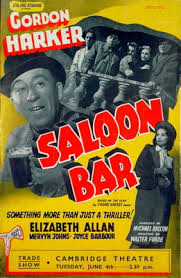
Saloon Bar is a 1940 British comedy thriller film directed by Walter Forde and starring Gordon Harker, Elizabeth Allan and Mervyn Johns. It was made by Ealing Studios and its style has led to comparisons with the later Ealing Comedies, unlike other wartime Ealing films which are different in tone. It is based on the 1939 play of the same name by Frank Harvey in which Harker had also starred. An amateur detective tries to clear an innocent man of a crime before the date of his execution.

The Calendar is a black and white 1948 British drama film directed by Arthur Crabtree and starring Greta Gynt, John McCallum, Raymond Lovell and Leslie Dwyer. It is based on the 1929 play The Calendar and subsequent novel by Edgar Wallace. A previous version had been released in 1931.

Dr. O'Dowd is a 1940 British drama film directed by Herbert Mason, produced by Sam Sax for Warner Bros and starring Shaun Glenville, Peggy Cummins, Felix Aylmer and Irene Handl. Set in Ireland, it focuses on Marius O'Dowd, an Irish doctor, who works to restore his relationship with his son after his daughter-in-law dies under O'Dowd's care. The film was the onscreen debut for Peggy Cummins, who was only thirteen at the time. It was well received by critics, and Cummins' role was the subject of particular praise. The film is currently missing from the BFI National Archive, and is listed as one of the British Film Institute's "75 Most Wanted" lost films.
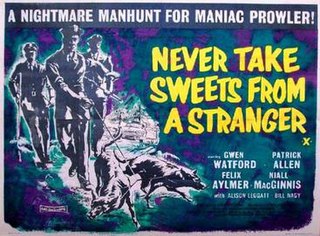
Never Take Sweets from a Stranger is a 1960 British thriller drama film, directed by Cyril Frankel and starring Patrick Allen, Gwen Watford, Janina Faye and Felix Aylmer. The screenplay was by John Hunter based on the 1954 play The Pony Cart by Roger Garis. It was produced by Hammer Films. The twin themes of the film are paedophilia and child sexual abuse, and the way in which those with sufficient pull can corrupt and manipulate the legal system to evade responsibility for their actions. The film is regarded as bold and uncompromising for its time.

Lease of Life is a 1954 British drama film made by Ealing Studios and directed by Charles Frend. The film was designed as a star vehicle for Robert Donat in his return to the screen after a three-year absence.

Hi Gang! is a 1941 British comedy film directed by Marcel Varnel and starring Bebe Daniels, Ben Lyon and Vic Oliver. It was a spin-off from the popular BBC radio series Hi Gang!.

Spies of the Air is a 1939 British adventure film directed by David MacDonald and based on the play Official Secret by Jeffrey Dell. The film stars Barry K. Barnes, Roger Livesey, Basil Radford, Edward Ashley and Felix Aylmer. Spies of the Air involves espionage in the period just before the outbreak of war in Europe that spawned a number of similar propaganda films linking aeronautics and spies. Films in both Great Britain and the United States centred on "... spies and fifth columnists (as) the staple diet of films made during the first year of the war."

Make Me an Offer is a 1954 Eastmancolor British comedy film directed by Cyril Frankel and starring Peter Finch, Adrienne Corri, Rosalie Crutchley and Finlay Currie. It is based on the 1952 novel of the same title by Wolf Mankowitz. It was distributed by British Lion Films.
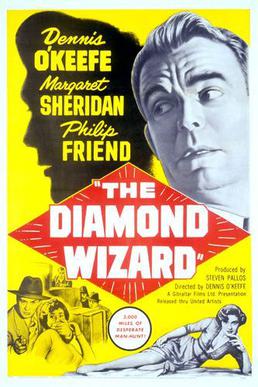
The Diamond is a 1954 British film noir crime film directed by Montgomery Tully/Dennis O'Keefe and starring Dennis O'Keefe, Margaret Sheridan and Philip Friend. It is based on the 1952 novel Rich Is the Treasure by Maurice Procter. It was released by United Artists in Britain and in America, where it was known as The Diamond Wizard.



















